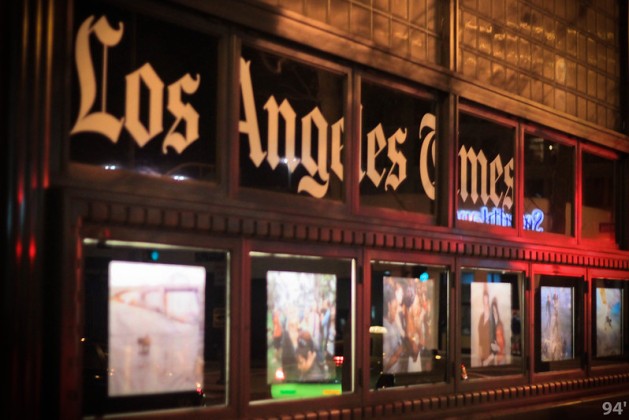
Jeff Bezos. Photo (cc) 2019 by Daniel Oberhaus.
The New York Times has published a story (free link) that calls into question the rise of billionaires who own news organizations, noting that The Washington Post under Jeff Bezos, the Los Angeles Times under Patrick Soon-Shiong and Time magazine under Marc Benioff are all losing money. True enough. My problem with the story is that reporters Benjamin Mullin and Katie Robertson try too hard to impose an ubertake when in fact there’s important background with each of those examples. Mullin and Robertson write:
All three newsrooms greeted their new owners with cautious optimism that their business acumen and tech know-how would help figure out the perplexing question of how to make money as a digital publication.
But it increasingly appears that the billionaires are struggling just like nearly everyone else. Time, The Washington Post and The Los Angeles Times all lost millions of dollars last year, people with knowledge of the companies’ finances have said, after considerable investment from their owners and intensive efforts to drum up new revenue streams.
The role of wealthy newspaper owners is something of ongoing interest to me. My last book, “The Return of the Moguls” (2018), focused on the Post, The Boston Globe and the Orange County Register in Southern California, owned by a rich Boston-area businessman named Aaron Kushner. At the time the book came out, the Post was flying high, the Globe was muddling along and the Register was failing; it eventually fell into the hands of the slash-and-burn hedge fund Alden Globe Capital. The Post’s and the Globe’s fortunes have since moved in opposite directions.
Here are the particulars that get glossed over in Mullin and Robertson’s attempt to impose an overarching framework:
• Bezos, who bought the Post in 2013, made deep investments in technology and built up the staff. The result was years of growth and profits, which only came sputtering to a halt after Donald Trump left the White House. Former executive editor Marty Baron, in his book “Collision of Power,” suggests that, over time, a disciplined approach to hiring became more lax. In other words, the Post got ahead of itself and is now in the midst of a reset. A new publisher, William Lewis, begins work this month, and we’ll see if he can articulate a strategy that amounts to more than “just like the Times only not as comprehensive.”
• Benioff bought a dog and, predictably, it’s going “woof woof.” Time was the largest of the Big Three newsweeklies, along with Newsweek and U.S. World & News Report; it’s also the only one of the three that still exists in a somewhat recognizable form. Newsweeklies succeeded because, pre-internet, you couldn’t get great national papers like the Times, the Post and The Wall Street Journal delivered to your doorstep. Not only is there no discernible reason for them to exist anymore, but the leading newsweekly these days, at least in terms of cachet, is The Economist.
• Not all billionaire owners are in it for the right reasons, and Soon-Shiong has proven to be an uncertain leader. Does he care about the Los Angeles Times or not? He’s built it up; now he’s tearing it down. He recently pushed out his executive editor, Kevin Merida, the most prominent Black editor in the country, and he’s done some truly awful things such as delivering Tribune Publishing’s papers to Alden Global Capital and more recently selling The San Diego Union-Tribune to Alden.
So what does that tell us about billionaire owners? Not much. As Mullin and Robertson acknowledge, some are doing just fine, including The Boston Globe under John and Linda Henry and The Atlantic under Laurene Powell Jobs. They could have also mentioned the Star Tribune of Minneapolis under Glen Taylor or, for that matter, The New York Times, a publicly traded company that is nevertheless under the tight control of the Sulzberger family. I don’t think the Sulzbergers are billionaires, but they are not poor.
At the moment, it seems that the only two viable models for large regional dailies is individual ownership by wealthy people who are willing to invest in future profitability and nonprofit ownership, either in the form of a nonprofit organization owning a for-profit paper, as with The Philadelphia Inquirer and the Tampa Bay Times, or a paper that goes fully nonprofit, as with The Salt Lake Tribune and The Baltimore Banner. The Banner is a digital startup that nevertheless is attempting to position itself as a comprehensive replacement for The Baltimore Sun. The Sun, in turn, was one of the Tribune papers that Soon-Shiong helped gift-wrap for Alden, and just this past week was sold to right-wing television executive David Smith.







